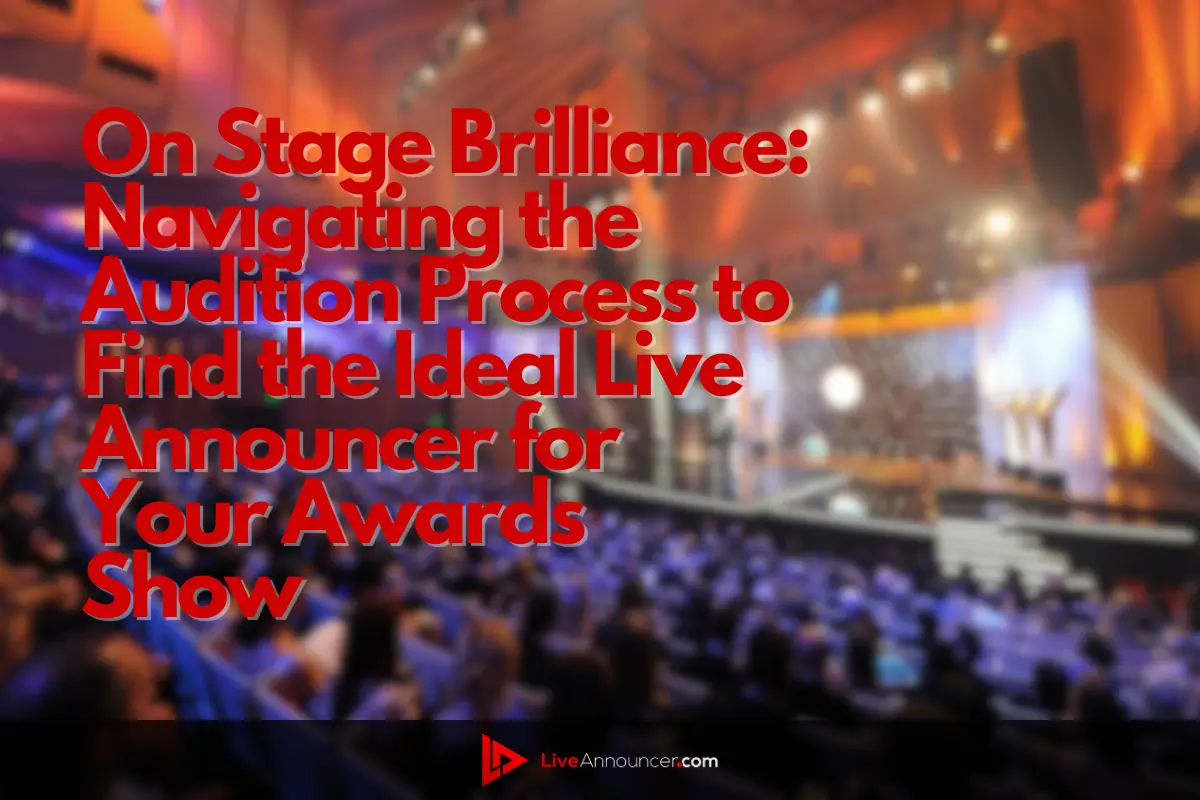
Organizing an award show is a challenging task. One has to look into numerous details and manage several things to ensure a flawless event. When it comes to hosting a great awards show, live announcers are incredibly important, but often overlooked, from first drafts of scripts to stunning live performances. Her voice is like the glue that holds everything together. They make the audience feel connected to the entire action and bring a lot of charm, excitement, and expertise. Finding the perfect live announcer is a critical factor in the success of your event. Now, let's explore ten essential aspects to think about on this wild ride from script to stage brilliance.
Understanding the Essence of the Live Announcer
Crafting the Ideal Script for the Audition
Embracing a Blend of First and Third-Person Narration
Clarifying Pronunciation and Diction
Evaluating Vocal Flexibility
Grasping the Power of Pauses and Timing
Expressing Emotions and Connecting with the Audience
Embodying Professionalism and Adaptability
Prioritizing Rehearsals and Feedback Loops
Selecting the Perfect Live Announcer for Your Awards Show
Live announcers are more than just a voice; they embody the tone and atmosphere of your event. They bring the script to life, giving it energy and appeal. A good live announcer can engage the audience and keep their interest throughout the event. Award show often includes achievers and performers, whom the live announcer might find a lot of work to entertain. However, as long as the live announcer knows and understands his/her role and is able to capture the vibe of the audience, the show will go smoothly.
A well-crafted script can help evaluate the skills of a potential live announcer. It should include a variety of tones, tempos, and moods to assess how the announcer fits into different scenarios and reflects different aspects of the awards show. One of the most important skills for a live announcer to show is that he/she is able to moderate her tone and voice as the show and the audience demand.
The script should include a mix of first-person and third-person narration. The first-person approach adds a personal touch, while the third-person narrative maintains a professional demeanor. This combination allows for versatility and a more complete assessment of an announcer's abilities. The announcer should know when to speak in what narrative. Flexibility in such a combination needs experience and expertise.
In order to be successful as a live announcer, it is essential to have clear pronunciation and perfect diction. It is important to ensure that the audition script contains words that may be difficult to pronounce. This way, you can verify whether the announcer is able to articulate complex sentences without difficulty. Make certain that the announcer is familiar with different terms and jargon peculiar to the event and the audience.
Good live announcers need to be able to change their voice depending on what's going on. They should be able to adjust their pitch, tone, and speed depending on what the event needs. Check out the script to ensure that there are any parts that require different vocal styles.
A skillful live announcer understands the significance of pauses and timing. Incorporate sections in the audition script that will necessitate well-timed pauses. This way you can assess the announcer's mastery. They should know how to build anticipation and emphasize key moments. Make sure that they are familiar with different psychological tricks and tools used in live performances. Such strategies are proven better in capturing the audience's attention and making the event successful.
A great live announcer speaks to the emotions of the audience and connects with them on a personal level. It's important to include moments in the script that require different emotional delivery, so your potential announcer can really connect with the audience. Such emotional persuasion will make your award show a memorable one.
The audition is a test of an announcer’s professionalism and flexibility. The announcer should be able to adjust, lead, and maintain a professional demeanor in the face of pressure. Such adjustments and adaptabilities are essential for a live broadcast.
Conducting rehearsals is an essential step you, as an award show organizer should not ignore. After shortlisting potential announcers, conduct rehearsal sessions to assess their performance. Offer constructive feedback and observe how they incorporate suggestions. A willingness to improve and adapt based on feedback is a valuable trait. Finalize the one who shows comparatively better potential for the best performance. Make sure to continue rehearsals with the chosen ones. During practices provide them with insights into the event and potential audiences. This will help them in making their script more suitable for the award show.
The final selection is a summary of the assessment process. Think about more than just the voice - make sure the live announcer can capture the spirit of the event. Pick the announcer who best fits your idea for a great, exciting, and unforgettable award show.
Award shows are often celebrations of success and prosperity. Such shows represent enthusiasm, energy, and promise for future growth. The live announcer should match the spirit of the event and show the same amount of energy and promise as the audience shows. Finding the perfect live announcer takes a lot of planning, research, and attention to detail. From the start of the story to the big stage, it's all about finding the voice that will capture the heart of your event and leave a lasting impression on the crowd. Remember to follow the strategies and remember the key points that we have discussed. That way, your awards show will be one to remember.


